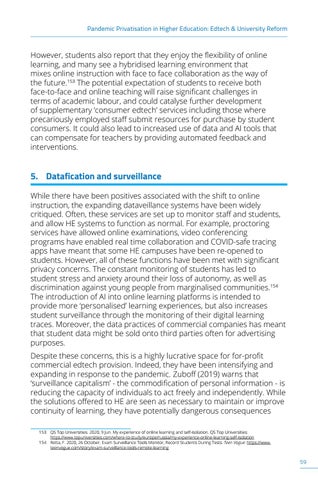Pandemic Privatisation in Higher Education: Edtech & University Reform
However, students also report that they enjoy the flexibility of online learning, and many see a hybridised learning environment that mixes online instruction with face to face collaboration as the way of the future.153 The potential expectation of students to receive both face-to-face and online teaching will raise significant challenges in terms of academic labour, and could catalyse further development of supplementary ‘consumer edtech’ services including those where precariously employed staff submit resources for purchase by student consumers. It could also lead to increased use of data and AI tools that can compensate for teachers by providing automated feedback and interventions.
5. Datafication and surveillance While there have been positives associated with the shift to online instruction, the expanding dataveillance systems have been widely critiqued. Often, these services are set up to monitor staff and students, and allow HE systems to function as normal. For example, proctoring services have allowed online examinations, video conferencing programs have enabled real time collaboration and COVID-safe tracing apps have meant that some HE campuses have been re-opened to students. However, all of these functions have been met with significant privacy concerns. The constant monitoring of students has led to student stress and anxiety around their loss of autonomy, as well as discrimination against young people from marginalised communities.154 The introduction of AI into online learning platforms is intended to provide more ‘personalised’ learning experiences, but also increases student surveillance through the monitoring of their digital learning traces. Moreover, the data practices of commercial companies has meant that student data might be sold onto third parties often for advertising purposes. Despite these concerns, this is a highly lucrative space for for-profit commercial edtech provision. Indeed, they have been intensifying and expanding in response to the pandemic. Zuboff (2019) warns that ‘surveillance capitalism’ - the commodification of personal information - is reducing the capacity of individuals to act freely and independently. While the solutions offered to HE are seen as necessary to maintain or improve continuity of learning, they have potentially dangerous consequences 153 QS Top Universities. 2020, 9 Jun. My experience of online learning and self-isolation. QS Top Universities: https://www.topuniversities.com/where-to-study/europe/russia/my-experience-online-learning-self-isolation 154 Retta, F. 2020, 26 October. Exam Surveillance Tools Monitor, Record Students During Tests. Teen Vogue: https://www. teenvogue.com/story/exam-surveillance-tools-remote-learning
59


